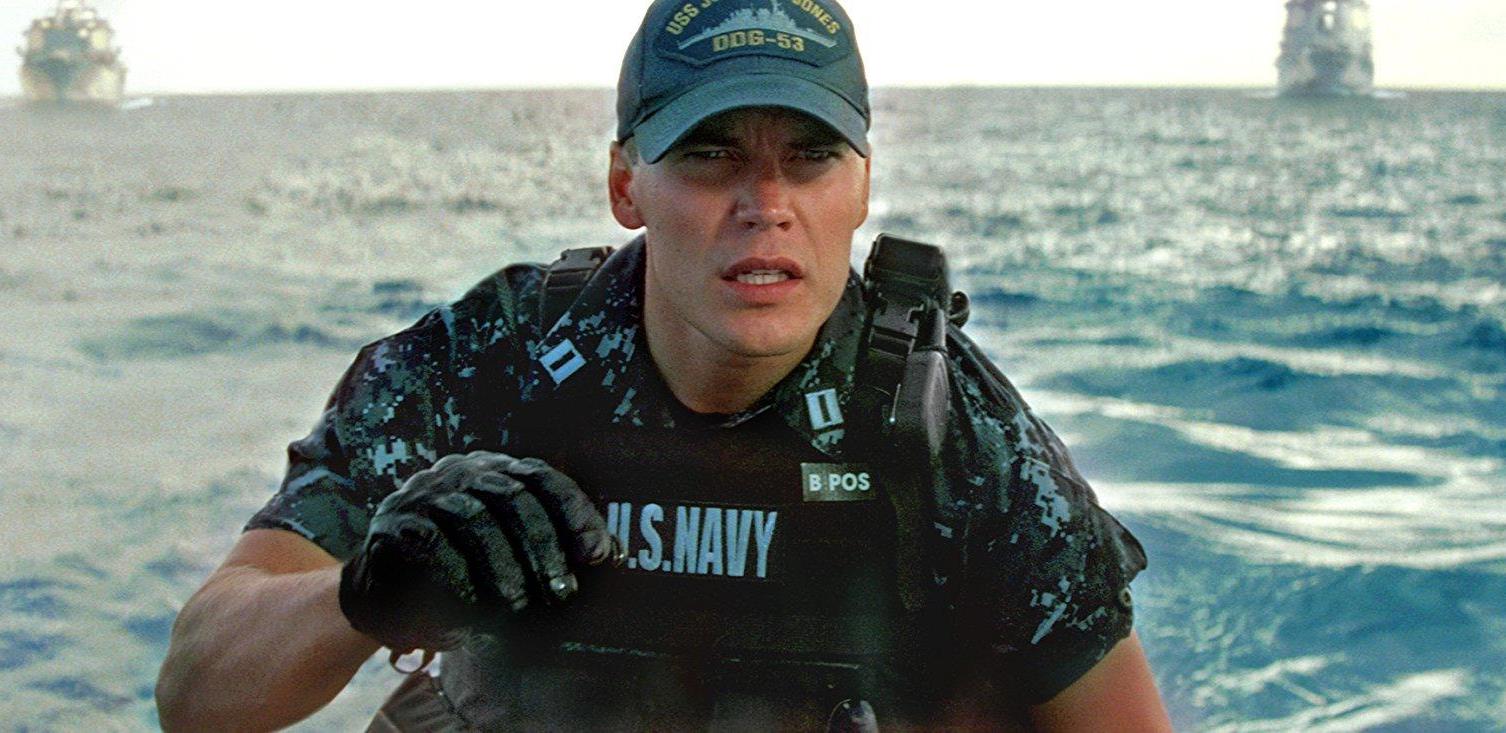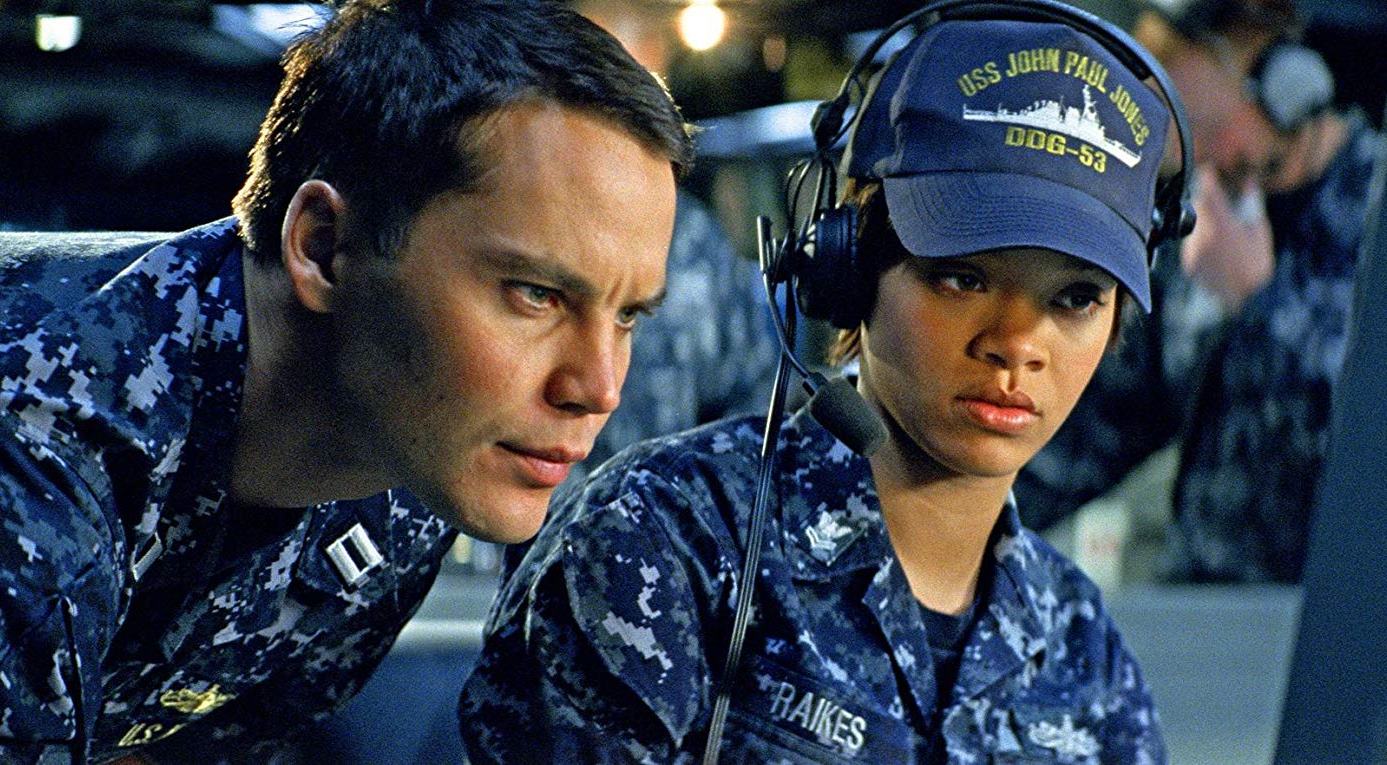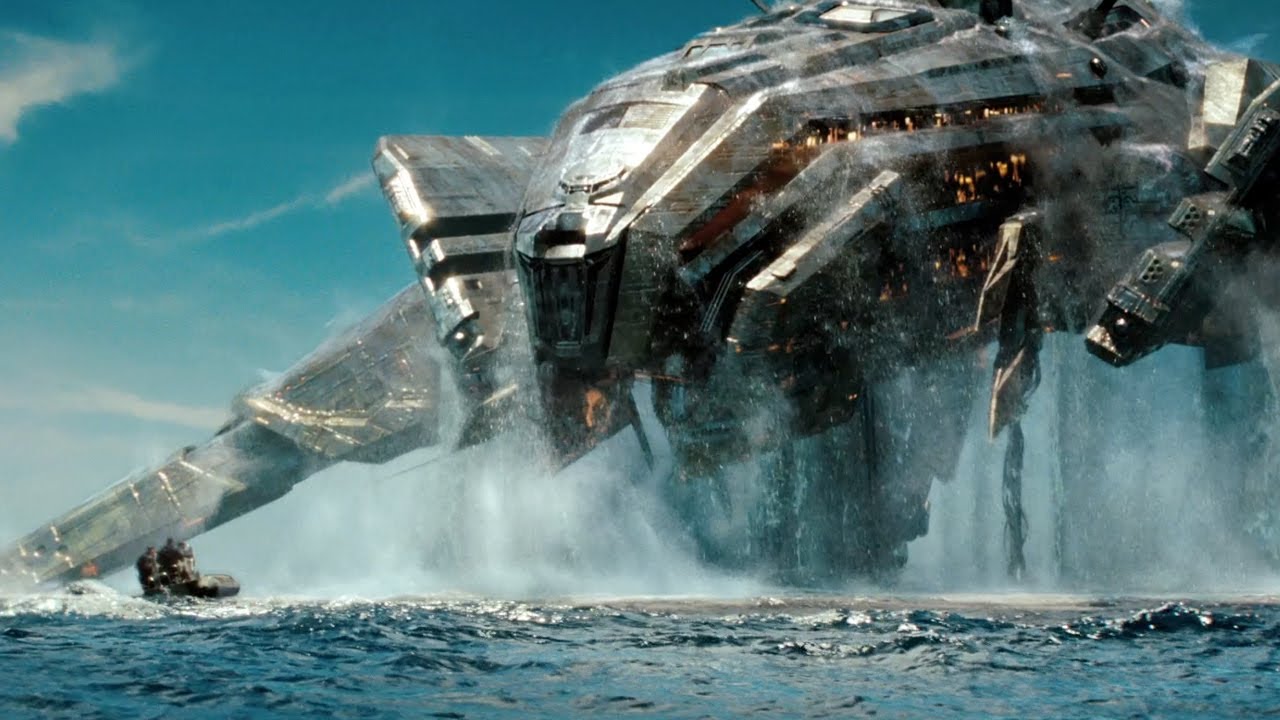USA. 2012.
Crew
Director – Peter Berg, Screenplay – Erich Hoeber & Jon Hoeber, Based on the Boardgame by Hasbro, Producers – Sarah Aubrey, Peter Berg, Brian Goldner, Duncan Henderson, Bennett Schneir & Scott Stuber, Photography – Tobias A. Schliessler, Music – Steve Jablonsky, Visual Effects Supervisors – Grady Cofer & Pablo Helman, Visual Effects – Industrial Light and Magic, Additional Visual Effects – Double Negative, The Embassy Visual Effects, Furious FX, Image Engine (Supervisor – Chris Harvey), New Deal Studio, Prologue Films (Supervisors – Peter Jopling) & Scanline VFX, Special Effects Supervisor – Burt Dalton, Production Design – Neil Spisak. Production Company – Hasbro/Bluegrass Films/Film 44.
Cast
Taylor Kitsch (Lieutenant Alex Hopper), Brooklyn Decker (Sam Shane), Liam Neeson (Admiral Shane), Alexander Skarsgård (Commander Stone Hopper), Rihanna (Petty Officer Cora ‘Weps’ Raikes), Tadanobu Asano (Captain Yugi Nagata), Gregory D. Gadson (Lieutenant-Colonel Mick Canales), Hamish Linklater (Cal Zapata), John Tui (Chief Petty Officer Walter ‘The Beast’ Lynch), Jesse Plemons (Seaman Jimmy ‘Ordy’ Ord), Adam Godley (Dr Nogrady), Peter MacNichol (Secretary of Defense)
Plot
Astronomers announce that they have successfully established communication with the Earth-like world in another solar system, which has been named Planet G. In Oahu, Hawaii, Alex Hopper gets in trouble with the law for trying to break into a convenience store to obtain a chicken burrito to impress a girl he met in a bar. Five years later and Alex’s older brother Stone has forced him to enlist in the Navy and he has risen to the rank of lieutenant. He is dating the chicken burrito girl, who is none other than Sam, the daughter of Admiral Shane, and Alex is trying to find the courage to ask her father’ permission to marry her. Just as they are about to depart on the RIMPAC war exercises with ships from other countries, Alex gets into a fight with the Japanese captain, which has him about to be relieved of duty. As they set out to sea, five alien objects arrive from the direction of Planet G. One of these strikes a satellite, causing mass destruction as it comes down in Hong Kong, while the others impact in the ocean near the war games fleet. Alex heads a party sent out to investigate but as soon as he touches the artifact, it establishes a forcefield dome up around that area of the ocean. Alien machines emerge and obliterate the naval destroyers as they move into attack. This makes Alex the senior ranking officer left alive inside the dome and he takes command of the single remaining vessel the USS John Paul Jones. There he must use his ingenuity and the limited resources available to him to outwit the aliens and their overwhelmingly more powerful weaponry before they establish the beachhead they need to overrun the Earth.
It was the success of Michael Bay’s Transformers (2007) and sequels that saw a sudden cinematic interest in the potential of toys and games. This saw a host of other such properties announced, including films based on Cluedo and Ridley Scott’s fascinatingly strange idea of a film version of Monopoly, none of which have so far been greenlit. The only other films to so far emerge out of this have been G.I. Joe: The Rise of the Cobra (2009), The Lego Movie (2014) and Battleship here. It should be noted that G.I. Joe, the Transformers films and Battleship are all properties owned by the toy and board game company Hasbro.
The Battleship game was first published by Milton Bradley in 1943, where it was initially known as Broadsides and played on pieces of paper. Players mark off a 10×10 grid and place their battleships over squares of their own choosing. The opponent cannot see these and must guess where the ships are by calling out grid coordinates. If one of these corresponds with the square where the other player has placed one of their battleships, it is considered a hit. When all the spaces that a battleship occupies are hit, it is sunk. The winner is the first player to sink all of the opposing player’s ships. Battleship was a popular success, most people being familiar with the version that Milton Bradley marketed as a boardgame in 1967 where players placed small pegs into plastic grids to mark their shots. Battleship was acquired when Hasbro brought out Milton Bradley in 1984. Versions of the game have been adapted into videogames, even apps for the mobile phone. It should be noted, especially in comparison to the film here, that the game is marketed as ‘a naval strategy game’ and is about ships firing missiles into areas of the ocean to destroy others. There are no alien invaders in any of the game incarnations.
The film version of Battleship is made by Peter Berg. Berg is a former actor – see him in films like Shocker (1989), Late for Dinner (1991), Fire in the Sky (1993), The Last Seduction (1994) and as a regular on tv’s Chicago Hope (1994-2000). Over the last decade, Berg has been making a career as a director beginning with the black comedy Very Bad Things (1998) and progressing through the likes of The Rundown (2003), Friday Night Lights (2004) and The Kingdom (2007). Berg has occasionally dabbled in genre material with the tv movie Virtuality (2008) and most notably the Will Smith superhero film Hancock (2008), while he has been associated with a number of other genre projects like adaptations of Robert E. Howard’s Brak Mak Morn and the graphic novel Hercules and was one of a revolving door of directors attached to a touted remake of Dune (1984), as well as produced Crouching Tiger, Hidden Dragon: Sword of Destiny (2016). Subsequent to Battleship however, Berg appears to have specialised in films of a pro-militaristic bent and/or showing their flag-waving patriotism with the likes of Lone Survivor (2013), Deepwater Horizon (2016), Patriot’s Day (2017) and Mile 22 (2018).
The idea of a big-budget film based on a kid’s strategy game where players try to guess where each other’s pieces are on the board seems exceedingly limited (not to mention lame) as a cinematic concept. Indeed, Battleship feels like Hasbro have given Peter Berg and the writers instructions to go away and make another Transformers but with a naval setting. A more accurate film of the Battleship game would surely come out as something like The Hunt for Red October (1990) – a combat thriller as a surface vessel attempts to guess in which quadrant another vessel that is invisible to sight and radar is located. To be fair to Battleship, it does contrive a scene where the crew of the ship use a series of seismic buoys to try and plot out the area of the ocean where the alien vessels are hiding that approximates the nature of the game. Still, this is only one scene and most of the rest of the film instead takes place as the gleeful orgy of mass destruction, testostoranal male antics and glorification of military hardware that Michael Bay patented.

One went into Battleship expecting precisely that. Only the film emerges as at best a Michael Bay wannabe – indeed, the perfect soundbite would be to imagine Battleship as Michael Bay’s Pearl Harbor (2001) uprooted and transported into the midst of one of his Transformers films. Peter Berg has brought on board Industrial Light and Magic who do an impressive job of blowing things up. Only there is never the frisson you get in a Michael Bay film in looking at the sheer artistry that has gone into the insanely oversized colossus of mass destruction that has been put on for us.
We get various scenes with hawk-like ships rising up out of the ocean, they and the navy ships firing missiles through the air at one another and the rather silly climactic image of ships doing mid-ocean skids by dropping their anchors. Because scenes of ships shooting missiles at one another are somewhat limited in possibilities, Peter Berg cuts away to a few land-based mass destruction scenes with a fallen satellite causing devastation in Hong Kong and a series of yoyo-like alien buzzsaw machines tearing up Air Force bases and freeways. In between, we also get a number of scenes of hand-to-hand combat between humans and the aliens in their bulky power-armour, which never seem particularly exciting given that the aliens seem to so vastly outpower their human opponents.
One supposes in all of these respects that Battleship proved to be exactly what one expected of it and what the trailer led one to believe so there is no complaint. The film certainly comes with as little brain, depth or intellectual content gone into it – just like the average Michael Bay film. The dialogue feels written by the scriptwriters in their sleep and the rest rewritten by the film’s army of advisors to insert a maximum amount of military doubletalk.
The cast never do much except posture and pose. Taylor Kitsch, still trying to shake off the flop of John Carter (2012), is stuck with the difficult role of trying to look handsome while alternating between being perfectly pressed and in command and a bad boy (although not so non-adorably bad as to not leave money behind after breaking into a convenience store to steal a chicken burrito and not so anti-authoritarian and non-traditional as to as to want to ask his girlfriend’s father for permission to marry her).
The worst to come out of the show is singer Rihanna in her debut performance, proving the old adage about singers who try to branch out into acting should stay to doing what they do best, where she tries vaguely to seem tough but mostly looks lost inside a uniform several sizes too big for her and comes across an exceedingly wimpy imitation of Jenette Goldstein in Aliens (1986).

The substantial turn-off for me was the film’s constant adulation of American militarism. We have seen this fascination with the glory of the US military war machine and its heroes play out through a number of films of recent years – particularly Pearl Harbor, the Transformers films and the similar recent Battle Los Angeles (2011) (although surprisingly not G.I. Joe, which one would have imagined would have been a natural for it). Given that the US has been at war on several fronts consistently since 2001, none of this is particularly surprising.
There is the almost pornographic show of US war machines in action that we get in Transformers or here of the ships moving in formation and big guns being loaded; the rows of officers looking handsome and pressed in their uniforms; the reverential posing of and tribute to the war veterans who here become the last minute cavalry that save the day; the constant bustle of technical doubletalk and commands being snapped off; the inclusion of a real-life Gulf War veteran and double amputee Gregory D. Gadson as a defeated soldier who rediscovers his heroism and worth despite being crippled. The dialogue comes less in speeches than it does in comic-bookish statements of declamatory defiance in the face of the enemy: “We’re going to buy the Earth another day,” “Throw everything at them,” “They’re not going to sink this battleship.”
Though the film makes a virtue of having an international fleet, the focus is solely on the American naval machine – for instance, though Japanese commander Tadanobu Asano plays a role in the film, it is solely the American ships that the film takes place on, the US naval forces we see lined up in formation, never any cutaways to show members of the Japanese navy saluting their flag and so on.
Moreover, the film seems to hold an underlying racism to it. Much of Taylor Kitsch’s vendetta against Tadanobu Asano appears to come out of nationalistic pique at the US fleet losing to the Japanese in a game of soccer at the start – this conflict seems more there for the film to not-so-subtly use the association with Pearl Harbor and include an eventual conciliation between the two former enemies as though to say “we’re on the same side now.” Elsewhere, we have scenes where the various international navies are lined up and Jesse Plemons’ seaman stands in line mocking each of their accents under his breath – when this is pitched as a joke, it sits on a dubious line of racial intolerance.
It is very much as it was during the classic heyday of the alien invader films of the 1950s where the US was constantly coming up against a technologically superior force that obliterated the world before scientists and engineers would discover their weakness and contrive a means to defeat them. Where alien invader films of the 1950s stood up to the fears of the Atomic Age and looming threat of the Soviet Union, these films seem to be looking to the threats of the post-9/11 world, saluting the flag in unison and declaring “we can kick your ass because we have more and bigger guns than anybody else,” an attitude that in the real world seems to have less done anything to cower the enemy than it has turned the United States into a country that regards the world with constant belligerence and suspicion in much the same way that extremist militia groups look upon anybody who lives outside their fortified encampments.

I hate these kind of films because they are no more than recruiting commercials for the armed services. They see war as fun. Here we even given war as positive life transformational experience where Taylor Kitsch’s arc is the ‘inspirational story’ of how being browbeaten and literally ordered by his brother to enlist (Alexander Skarsgård seems to have no other role in the film than to stand around and tell Taylor Kitsch to sort himself out and get a job) can cause an aimless slacker to turn his life around, make a man of him and help him win the admiral’s daughter. I am sure scenarios similar to this have happened before – well the slacker and the admiral’s daughter part sounds more like it exists in the realms of fantasy than reality (and I’d question whether people low in motivation being browbeaten into enlisting would ever end up being shining successes).
However, what all of this adulation of heroism, sacrifice and following orders never reveals is that the real purpose of the armed forces is to train people to go out into the field and kill others with maximum efficiency and usually to be expected to get killed themselves. It may make men out of some people but this hardly seems a consolation when the result frequently ends up with said men as corpses. Contrast all of the wonderful glorification of the military machine here with the reality of the modern US armed forces in the field in Iraq and Afghanistan. Take a realistic assessment of its actions – the wholesale slaughter of a civilian population by US troops that has killed an estimated 100,000+ people, the systemic advocacy of torture and passive condoning of atrocities conducted by the troops such as at Abu Ghraib, the lack of apology for the blatant lies told by the top brass about misleading the public for the reasons for going to war, the incompetent initial assessment of the operation and sheer unpreparedness that went into the planning, ground troops that were misled into enlisting and then had the rules about tours of duty changed under their feet – and ask if you cannot see a gulf between the joys of war that you see portrayed up on screen here and the reality.
In all of this, Peter Berg seems to be shaping up as a director who holds an ardently and unapologetically pro-military outlook – his father was a military historian. Berg has also made a number of other strong ardently pro-military films with The Kingdom and the subsequent true-life Navy SEALS film Lone Survivor (2013) and other works that become increasingly more red-blooded in their flag-waving patriotism with Deepwater Horizon (2016) and the Boston Marathon Bombing film Patriot’s Day (2017). There is a video circulating the internet – see here at YouTube – where Berg berates an Israeli journalist, accusing him of being a “draft dodger” and calls the necessity of invading Iran to prevent development of a nuclear weapon one of the greatest issues of our time, which makes him out as a wholehearted advocate of muscularly overbearing American militarism.
Like David Zucker and his pro-war preaching with An American Carol (2008), you wish that if Peter Berg is so ardently in favour of the military he would spend his fervour less in telling the world how glorious the American armed forces are that he would get out of his director’s chair and go and enlist himself. Not that I’d want to be so mean-spirited as to accuse Berg of being an armchair soldier engaged in fantasies of glory and calling others out for their supposed cowardice while never actually having had any combat experience himself.
Trailer here


